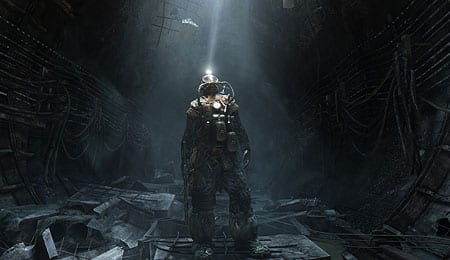Video Game Review: Metro: Last Light

Turns out the future isn’t so bright after all.
It has been a wild ride for developer 4A Games’ Metro: Last Light, the follow up to 2010’s Metro 2033, as the game was delayed and then included in THQ’s bankruptcy proceedings (in which Deep Silver swooped in and bought the publishing rights). Now that the game has finally seen the *ahem* “light” of day, is it actually worth playing? Da.
CONTROLS (4.5/5)
Standard Call of Duty controls are in place here right down to the analog sticks being used for sprinting and melee attacks, respectively. Cycling through weapons is done with a face button, while the right bumper brings up a pair of radial menus to manage your equipment — toggling your flashlight, putting on your mask, changing your filter and more. Everything works well, and aiming is responsive.
That being said, two minor issues are worth noting. First, there are instances throughout the game when you’ll come up behind an enemy and the option to kill or knock them out won’t appear, instead leaving the controls to execute their normal function (stabbing and reloading). I’m not sure what the cause is, but it’s annoying when it comes up. Second, the game allows you to keep pulling the trigger without ammo in the gun instead of automatically reloading. It’s not a flaw, per se, it’s just something uncommon to be aware of.
GRAPHICS/SOUND (3.75/5)
Most of Last Light looks good, and the development team has done a nice job of crafting a living, breathing post-apocalyptic world where nothing feels out of place. The presence and/or absence of light, which makes for a key gameplay element, is well presented for the most part. The presentation isn’t airtight, however, as there are times when you’ll encounter weird graphical flutter and others when the washed-out nature of the colour palette makes it difficult to distinguish things out clearly.
Also, special mention should be made of the overused “screen turns red with damage” mechanic. It’s already annoying in moderation on other shooters, but it’s taken to the nth degree here — and no, we don’t mean when stuff splatters on your mask. Getting shot a few times in a darkened room can rupture into a death sentence because the obscured vision in already-dark environments makes it incredibly hard to find cover or escape routes. Maybe it was a design choice to encourage stealth and ammo conservation, but even playing that way we found it incredibly frustrating.
Anyone remember that Tom Cruise movie, Valkyrie? Well, if not, it was based on a German plot to assassinate Adolf Hitler. What was odd about it was that neither Cruise, nor any of his supporting actors, spoke with a German accent. Apparently, director Bryan Singer decided it’d be better just to tell the story than to have these American and British actors doing German accents. I bring this up because throughout Metro: Last Light I kept thinking about how distracting the Russian accents were.
Personally, we would’ve preferred they all spoke Russian with subtitles (there’s audio mixing issues that made us turn them on anyway) or just bypassed the accents entirely. Instead, you’ve got the remnants of a Russian city that speak English with a heavy accent. That’s fine for the type of throwaway story you get in most shooters, but it’s a major part of Last Light, and we couldn’t help but feel that some of its potency was, dare we say, lost in translation. The soundtrack is dark and brooding, which suits the mood quite well, while the roars of mutants and pop of gunfire are solid.
GAMEPLAY (4/5)
Set approximately a year after the events of Metro 2033 (which, if our calculations are correct, means it’s somewhere in the neighborhood of 2034), Last Light once again puts you in the weathered boots of Artyom. Don’t worry if you didn’t play the original, as the (bad) ending is rehashed and plays a significant role in the plot of its sequel. Things begin when a Dark One is spotted, causing the leader of the Rangers to dispatch you to kill what’s believed to be the last of the creatures.
Not everyone is convinced that’s the correct course of action, but before you can make the decision to kill or capture it you’re taken prisoner yourself. This event sets the wheels turning on the roughly nine-hour campaign as you attempt to sort out what’s really going on in the metro amid political and military maneuverings from the three primary factions (Polis, Reds and Reich). It’s a solid tale, and within the shooter genre it rates among the more interesting and thought provoking ones out there.
Beyond the intriguing storyline, Metro: Last Light also distinguishes itself through its dual-purposed gameplay. This is not a run-and-gun game in which you move from one set piece to the next, summarily killing everything in your path. Instead, the game councils restraint, offering you the option to advance through the vast majority of it without killing a soul. In fact, it’s clear that this is the preferred approach with most of the achievements centred on completing sections in non-lethal fashion.
In place of hellacious shootouts are tense moments of stealth as you’ll use shadows and alternate routes to circumvent enemies. Getting close to a foe offers the option of killing them silently or knocking them unconscious, and based on how you approach these sections (as well as other moments in the game) you’ll get one of two endings.
The game’s stealth elements are generally well implemented, creating something akin to a first-person Splinter Cell as you’ll shoot out lights to create blind spots for your enemies. A meter on your wrist indicates if you’re visible or not, and as long as you move cautiously and don’t disable a foe mid-sentence you should be able to remain undetected.
No matter how you choose to play much of Last Light, however, there are times when you’ll need to rock and roll against the world’s various non-human inhabitants. These encounters felt uneven to me, with the creatures seemingly obeying and defying precedents set earlier in the game. By which we mean you can fight the same group of enemies the same way several times and end up with different results — like needing six rounds to kill something instead of three, or watching a creature that’s supposed to shrivel up in the light completely ignoring it and whooping your ass.
Enemy A.I. can be all over the place as well. At times you can disable guards or shoot out a light mere feet from another enemy without them so much as batting an eye. Once they’ve been alerted to your presence, though, it seems like they become clairvoyant and can hunt you down no matter how dark of a corner you seek refuge in.
Fans of Metro 2033 will also immediately note that ammo and filters are more plentiful, aiming is more accurate and enemies aren’t as difficult to defeat. That brings us to Ranger Mode, which per the developer is the way the game was meant to be played. Here you’ll lose your heads-up display, ammo will be scarcer and foes will be tougher. Sounds like a worthwhile challenge, right? Well, unless you pre-ordered the game you’ll need to part with another US$5 (400 MSP) to experience it. It’s a cheap trick that chips away at the underdog vibe the game had going for it.
OVERALL (4/5)
Like many series that struck a fresh chord with their initial endeavor, Metro: Last Light gravitates back toward the mean with a more traditional (and forgiving) shooter campaign. It’s still unique enough to be distinguishable from the likes of Call of Duty or Battlefield, but the line is certainly blurrier than it was in Metro 2033 — and it costs an extra US$5 to bring that line back into focus.







